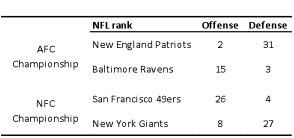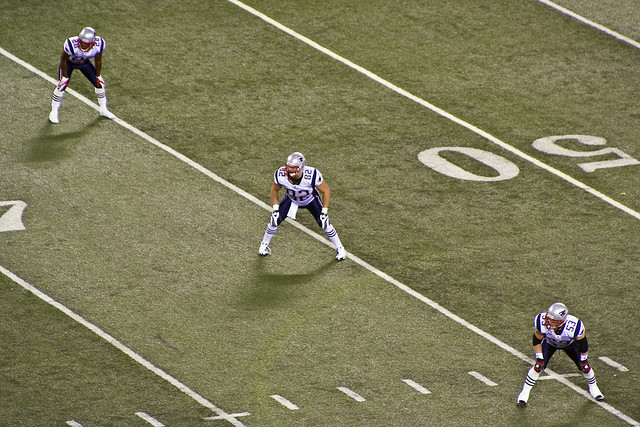Does Defense Really Win Championships?

The following is a guest post by Tobias J. Moskowitz and L. Jon Wertheim, authors of Scorecasting: The Hidden Influences Behind How Sports Are Played and Games Are Won, now out in paperback. Moskowitz is a University of Chicago financial economist, and Wertheim is senior writer at Sports Illustrated. You may remember Steve Levitt mentioning the book, or the Q&A with the authors on the blog. They are also regular contributors to the “Football Freakonomics” project.
Does Defense Really Win Championships?
By Tobias J. Moskowitz and L. Jon Wertheim
It’s at this point in the NFL postseason when every NFL analyst, pundit, and blogger will inevitably proclaim “defense wins championships.” With the NFL conference championships upon us this weekend, this phrase will be uttered more times than “yo” in a typical Jersey Shore episode. And why not?
Last weekend we saw two of the NFL’s top offenses — Green Bay and New Orleans — lose to better defenses. Moreover, as Chris Berman himself pointed out on ESPN’s Sunday NFL Countdown, 38 (out of 45) Super Bowls have been won by a top 10 defense and 22 have been won by a top three defense. The sentiment has hardened from cliché into an article of sports law. But is it actually true? Does defense really win championships?
In a word: no.
We found that when it comes to winning a title, or winning in sports in general for that matter, offense and defense carry nearly identical weight. For example, here’s what Berman didn’t tell you: the number of Super Bowl champs with a top 10 offense? Thirty-eight. And a top 3 offense? Twenty. In other words, offense wins championships, too.
We further found that among the 45 NFL Super Bowls, the better defensive team — measured by points allowed that season— has won 29 times. The better offensive team won 25 times. (Note that adds up to 53, which means that some teams are the better offensive and defensive team in the Super Bowl. Nineteen Super Bowls have featured a team superior on both sides of the ball. Those teams have won 14 of those games.) It’s a slight edge for defense, but it’s a pretty close call and not different from random chance. The favorite statistic of the “defense wins championships” proponents is that the top-ranked defense during the regular season has won 15 Super Bowls, whereas the top-ranked offense has won only 8. Although this would seem to confer an advantage to defense, these two numbers are not statistically different. And, remember, since the top-three defenses have won no more than the top-three offensive teams, it also means that offensive teams ranked 2 and 3 have won more Super Bowls than the second- and third-best defensive teams, though again, these differences are not statistically significant.
But we’re only talking about 45 games, so let’s broaden the sample size. There have been 427 NFL playoff games over the last 45 seasons. The better defensive teams have won 58 percent of them. The better offensive teams have won 62 percent of the time. (Again, the winning team is sometimes better both offensively and defensively, which explains why the total exceeds 100 percent.) That’s a slight edge to the offense, but again, pretty even.
In almost 10,000 regular season games, the better defensive team has won 66.5 percent of the time compared with 67.4 percent of the time for the better offensive team. That’s a slight nod to the offense but a negligible difference.
But maybe the phrase “defense wins championships” is supposed to mean is that defense is somehow more necessary than offense. Maybe a team can prevail with a middling offense, but not with a middling defense. As it turns out, that doesn’t hold up, either. Three times the Super Bowl champion ranked in the bottom half of the league in defense; only twice did it rank in the bottom half in offense. The lowest-ranked defensive team to win a Super Bowl was the 2006 Indianapolis Colts, rated nineteenth that year. (They offset that by ranking third in offense.) The lowest-ranked offensive team to win the Lombardi Trophy? The 2000 Baltimore Ravens, ranked nineteenth in offense but first in defense.
What about when a great offense faces a great defense? Twenty-seven Super Bowls have pitted a top 5 offense against a top 5 defense. The best offensive team won 13, and the best defensive team won 14. Another stalemate.
In the NFL it seems, you need either exceptional defense or exceptional offense to win a championship. But neither one is more important than the other.
Okay, but does defense give an underdog more of a chance? Are upsets more likely to be sprung by defensive-minded teams?
Sifting through the numbers, we found that the answer is again no. In the regular season, playoffs, and championships, underdog teams are no more likely to win if they are good defenders than if they are good scorers.
If defense is no more critical to winning than offense is, why does everyone from Little League coaches to ESPN analysts extoll its importance? Well, no one needs to talk up the virtues of scoring. No one needs to create incentives for players to score more touchdowns. There’s a reason why fans exhort “De-fense, De-fense!” not “O-ffense, O-ffense!” Offense is fun. Offense is glamorous. Who gets the Nike shoe contracts and the other endorsements — the players who score or the defensive stoppers?
Quick, which of the following set of names is more recognizable? The top five touchdown leaders in NFL history: Jerry Rice, Emmitt Smith, La-Dainian Tomlinson, Randy Moss, and Terrell Owens? Or the top five interception leaders: Paul Krause, Emlen Tunnell, Rod Woodson, Dick Lane, and Ken Riley?
Bottom line: Defense is no more important than offense. It’s not defense that wins championships. In virtually every sport, you need either a stellar offense or a stellar defense, and having both is even better.
So, who will win this weekend? Here’s how the teams stack up in terms of offense and defense:

(Note: every team is really good at either offense or defense.)
It’s a clear offensive vs. defensive matchup in both c
onference championships. If you believe the hype, it’ll be a matchup of the defensive-minded Harbaugh brothers in the Super Bowl. If you follow the numbers, it’ll likely be only one Harbaugh who makes it, but we couldn’t tell you which.


Comments